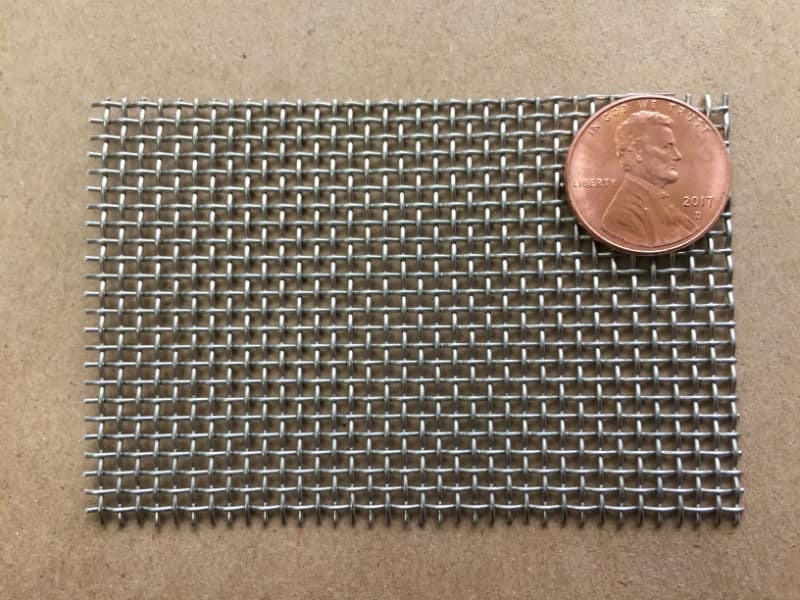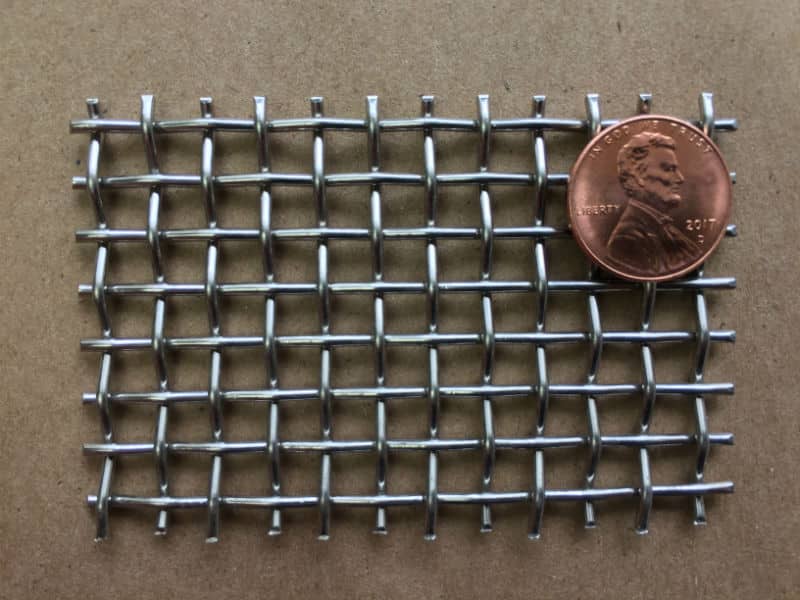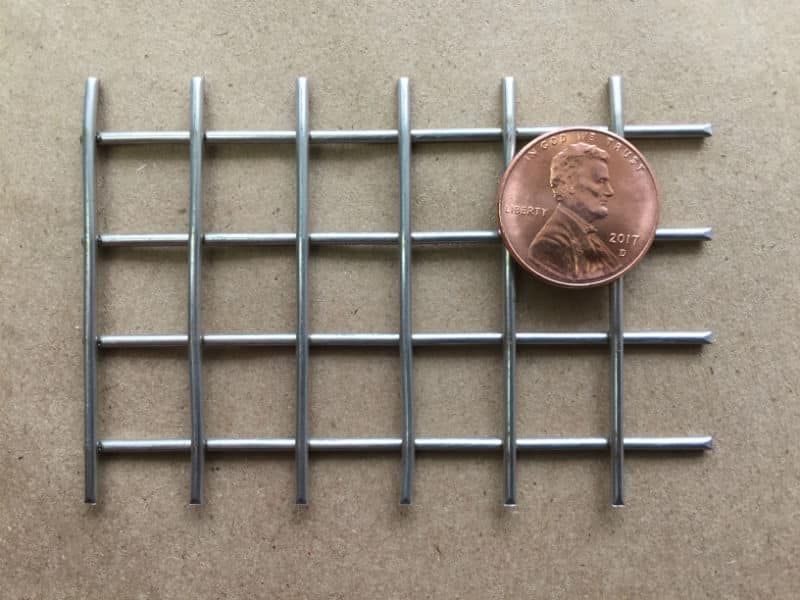
Alloys
There are different types of Alloys for the manufacturing of wire mesh. Depending on the application and the industry for the wire mesh will determine the type of alloys used.
As always, for specific information we recommend contacting an expert within your particular field, a metallurgist and/or a qualified engineer to discuss your requirements.
Stainless Steel Alloys
In metallurgy, stainless steel is a generic term used to describe a steel alloy with a chromium content of 10.5% or more. On the whole, stainless steels have a higher resistance to corrosion than plain (or carbon) steel. This resistance to corrosion in stainless steel is largely a result of the unique qualities of chromium.
Chromium combines with oxygen in the atmosphere, naturally forming a thin layer of chromium oxide. This extremely thin and invisible film serves as a protective coating in a wide range of corrosive environments. If the metal is cut or scratched and the film is ruptured, more oxide will quickly “self-repair” itself as to form and recover the exposed surface.
In the wire mesh industry, T-304 stainless steel and T-316 stainless steel are the most commonly used alloys to manufacture wire mesh and wire cloth. Other stainless steel alloys, like T-310 SS, T-321 SS, T-347 SS, and even T-430 SS, are less popular yet often available through special order or custom manufacturing, depending on quantity required.
T-304 Stainless Steel Wire Mesh: The Standard
T-304 stainless steel is the most widely available of all stainless steels in the wire mesh industry. Aside from the countless combinations of mesh opening sizes and diameter wire available both from stock and through manufacturing, T-304 SS exhibits many benefits and is largely considered the standard of the industry. T-304 SS has excellent corrosion resistance in a wide range of environments and allows itself for usage in a wide range of applications.
Another of the many benefits of T-304 SS is heat resistance. T-304 SS displays good oxidation resistance to a temperature of approximately 1600oF in intermittent service and to a temperature of 1700oF in continuous service. T-304 stainless steel is also excellent for fabrication purposes – it can be formed and cut to size with appropriate tools and machinery. It can also be welded, using most common welding techniques, and it is virtually non-magnetic in the annealed condition. Finally, from a cost standpoint, it is usually the most attractively priced of most readily available stainless steel mesh alloys in the industry, especially when taking into consideration its lifecycle.
The chart featured below displays the standard chemical composition for T-304 SS commonly used in the wire mesh and wire cloth industry. T-304 Stainless Steel is available in both woven and welded constructions – both from stock and through custom manufacturing.
T-316 SS Steel Wire Mesh: An Upgrade for Specific Applications
T-316 stainless steel is recognized as the second most widely available of all stainless steels in the wire mesh industry. T-316 stainless steel wire mesh is typically considered as an alternative grade to T-304 stainless steel wire mesh when certain environmental conditions exist. In particular, marine conditions and applications requiring heavy section welding commonly call for T-316 stainless steel due to its many benefits.
T-316 stainless steel has excellent corrosion resistance, and in particular, performs well in its ability to resist pitting and crevice corrosion in warm chloride environments. The inclusion of molybdenum (Mo) is a major factor to the improved corrosion resistance versus a T-304 SS counterpart.

T-316 stainless steel is heat resistant and has good oxidation resist resistance to a temperature of approximately 1600oF in intermittent service and to a temperature of 1700oF in continuous service. T-316 SS is also excellent for fabrication purposes – it can be formed and cut to size with appropriate tools and machinery. It also has outstanding weld-ability, and it is virtually non-magnetic in the annealed condition.
Other Stainless Steel Alloys
T-304 L SS – Usually a special order requirement, T-304 L SS woven wire mesh, with its low carbon content, is oftentimes specified in welding applications.
T-316 L SS – Usually a special order requirement, T-316 L SS woven wire mesh, with its low carbon content, is oftentimes specified in welding applications.
T-310 SS – Generally speaking, T-310 SS wire mesh is custom manufactured. It combines excellent high temperature properties with good ductility and weld-ability. It is usually reserved for high temperature service and has excellent toughness.

T-321 SS – T-321 SS wire mesh is usually a custom manufactured item, and as an austenitic 18/8 steel, it is stabilized by titanium and offers similar resistance to general corrosion as T-304 SS. Typical uses may include oil-refinery equipment and welded pressure vessels.
T-347 SS – T-347 SS wire mesh is usually a custom manufactured item, and as an austenitic 18/8 steel, it is stabilized by niobium and tantalum. These elements slightly improve corrosion resistance in certain environments. Typical uses may include high temperature gaskets and chemical product equipment.
T-430 SS – T-430 SS wire mesh usually requires custom manufacturing. It is a basic ferritic non-heat treatable stainless steel and offers good corrosion and oxidation resistance. Typical industrial applications may include plant equipment and oil-refinery equipment.
On Stainless Steel and Surface Rust
While stainless steel is corrosion resistant, that does not mean that stainless steel is completely rust proof, nor will it ever rust. It is important to remember that chromium, an important component of any stainless steel, combines with oxygen and forms a thin layer that serves as a protective barrier against a wide array of corrosive elements. Surface rust can appear when chlorides, like salts, acids and seawater, attack and destroy this chromium-oxide film quicker than it can repair itself.
Additionally, there are a handful of reasons why stainless steel may rust. If a stainless steel comes into contact and rubs against the surface of ordinary carbon steel or iron, surface rust may occur. Also, the welding process may cause rust. External contamination, in the form of harsh chemicals or less-than-ideal fabrication practices, may also cause surface rust.
There are a handful of chemical cleaning agents that will successfully remove free iron and most other contaminants, thereby keeping surface rust to a minimum. It is always important to clean and/or wipe down stainless steel to optimize corrosion resistance. Of course, there are numerous other after-market processes that are often used to protect stainless steel.
Finally, it is critical to highlight the fact that surface rust on stainless steel, albeit unsightly and ugly, should not impact the functionality of stainless steel. Again, the presence of chromium and its ability to form a protective layer, even under a rust spot, will prevent further corrosion. As briefly mentioned above, there are countless options for purchasers of stainless steel to pursue should they want to make sure that no surface rust forms on stainless steel surfaces.
Plain or Carbon Steel
In the wire mesh industry, plain steel – or carbon steel, as it sometimes referred to—is a very popular metal that is commonly manufactured in both woven and welded wire mesh specifications. It is comprised primarily of iron (Fe) with a small amount of carbon (C); generally speaking, it is a relatively low cost option that is versatile enough to be used in numerous applications, including window guards, shaker screens and fireplace screens. In some cases, plain steel wire mesh is used in gravel and stone separating in the mining and coal industries.
Plain steel wire mesh, whether it is available from stock or custom manufactured, is strong and magnetic. Oftentimes, it is dark in color, particularly when compared to bright aluminum or stainless steel meshes. And of course, because it is steel, it will not resist corrosion and will rust in most atmospheric conditions. In the certain industries, plain steel wire mesh is disposable item because of its strength and low cost.
Finally, there are times when plain steel is coated, normally an after-market process. Customers who are cost-conscious and still require some level of corrosion protection might opt for Galvanizing, PVC or Powder Coating, or even paint.
